- Home
- Samuel Beckett
Watt Page 9
Watt Read online
Page 9
After a short time Watt returned to the music-room, with a tray, of refreshments.
Not Mr Gall Senior, but Mr Gall Junior, was tuning the piano, to Watt’s great surprise. Mr Gall Senior was standing in the middle of the room, perhaps listening. Watt did not take this to mean that Mr Gall Junior was the true piano-tuner, and Mr Gall Senior simply a poor blind old man, hired for the occasion, no. But he took it rather to mean that Mr Gall Senior, feeling his end at hand, and anxious that his son should follow in his footsteps, was putting the finishing touches to a hasty instruction, before it was too late.
While Watt looked round, for a place to set down his tray, Mr Gall Junior brought his work to a close. He reassembled the piano case, put back his tools in their bag, and stood up.
The mice have returned, he said.
The elder said nothing. Watt wondered if he had heard.
Nine dampers remain, said the younger, and an equal number of hammers.
Not corresponding, I hope, said the elder.
In one case, said the younger.
The elder had nothing to say to this.
The strings are in flitters, said the younger.
The elder had nothing to say to this either.
The piano is doomed, in my opinion, said the younger.
The piano-tuner also, said the elder.
The pianist also, said the younger.
This was perhaps the principal incident of Watt’s early days in Mr Knott’s house.
In a sense it resembled all the incidents of note proposed to Watt during his stay in Mr Knott’s house, and of which a certain number will be recorded in this place, without addition, or subtraction, and in a sense not.
It resembled them in the sense that it was not ended, when it was past, but continued to unfold, in Watt’s head, from beginning to end, over and over again, the complex connexions of its lights and shadows, the passing from silence to sound and from sound to silence, the stillness before the movement and the stillness after, the quickenings and retardings, the approaches and the separations, all the shifting detail of its march and ordinance, according to the irrevocable caprice of its taking place. It resembled them in the vigour with which it developed a purely plastic content, and gradually lost, in the nice processes of its light, its sound, its impacts and its rhythm, all meaning, even the most literal.
Thus the scene in the music-room, with the two Galls, ceased very soon to signify for Watt a piano tuned, an obscure family and professional relation, an exchange of judgments more or less intelligible, and so on, if indeed it had ever signified such things, and became a mere example of light commenting bodies, and stillness motion, and silence sound, and comment comment.
This fragility of the outer meaning had a bad effect on Watt, for it caused him to seek for another, for some meaning of what had passed, in the image of how it had passed.
The most meagre, the least plausible, would have satisfied Watt, who had not seen a symbol, nor executed an interpretation, since the age of fourteen, or fifteen, and who had lived, miserably it is true, among face values all his adult life, face values at least for him. Some see the flesh before the bones, and some see the bones before the flesh, and some never see the bones at all, and some never see the flesh at all, never never see the flesh at all. But whatever it was Watt saw, with the first look, that was enough for Watt, that had always been enough for Watt, more than enough for Watt. And he had experienced literally nothing, since the age of fourteen, or fifteen, of which in retrospect he was not content to say, That is what happened then. He could recall, not indeed with any satisfaction, but as ordinary occasions, the time when his dead father appeared to him in a wood, with his trousers rolled up over his knees and his shoes and socks in his hand; or the time when in his surprise at hearing a voice urging him, in terms of unusual coarseness, to do away with himself, he narrowly escaped being knocked down, by a dray; or the time when alone in a rowing-boat, far from land, he suddenly smelt flowering currant; or the time when an old lady of delicate upbringing, and advantageous person, for she was amputated well above the knee, whom he had pursued with his assiduities on no fewer than three distinct occasions, unstrapped her wooden leg, and laid aside her crutch. Here no tendency appeared, on the part of his father’s trousers, for example, to break up into an arrangement of appearances, grey, flaccid and probably fistular, or of his father’s legs to vanish in the farce of their properties, no, but his father’s legs and trousers, as then seen, in the wood, and subsequently brought to mind, remained legs and trousers, and not only legs and trousers, but his father’s legs and trousers, that is to say quite different from any of the legs and trousers that Watt had ever seen, and he had seen a great quantity, both of legs and of trousers, in his time. The incident of the Galls, on the contrary, ceased so rapidly to have even the paltry significance of two men, come to tune a piano, and tuning it, and exchanging a few words, as men will do, and going, that this seemed rather to belong to some story heard long before, an instant in the life of another, ill told, ill heard, and more than half forgotten.
So Watt did not know what had happened. He did not care, to do him justice, what had happened. But he felt the need to think that such and such a thing had happened then, the need to be able to say, when the scene began to unroll its sequences, Yes, I remember, that is what happened then.
This need remained with Watt, this need not always satisfied, during the greater part of his stay in Mr Knott’s house. For the incident of the Galls father and son was followed by others of a similar kind, incidents that is to say of great formal brilliance and indeterminable purport.
Watt’s stay in Mr Knott’s house was less agreeable, on this account, than it would have been, if such incidents had been unknown, or his attitude towards them less anxious, that is to say, if Mr Knott’s house had been another house, or Watt another man. For outside Mr Knott’s house, and of course grounds, such incidents were unknown, or so Watt supposed. And Watt could not accept them for what they perhaps were, the simple games that time plays with space, now with these toys, and now with those, but was obliged, because of his peculiar character, to enquire into what they meant, oh not into what they really meant, his character was not so peculiar as all that, but into what they might be induced to mean, with the help of a little patience, a little ingenuity.
But what was this pursuit of meaning, in this indifference to meaning? And to what did it tend? These are delicate questions. For when Watt at last spoke of this time, it was a time long past, and of which his recollections were, in a sense, perhaps less clear than he would have wished, though too clear for his liking, in another. Add to this the notorious difficulty of recapturing, at will, modes of feeling peculiar to a certain time, and to a certain place, and perhaps also to a certain state of the health, when the time is past, and the place left, and the body struggling with quite a new situation. Add to this the obscurity of Watt’s communications, the rapidity of his utterance and the eccentricities of his syntax, as elsewhere recorded. Add to this the material conditions in which these communications were made. Add to this the scant aptitude to receive of him to whom they were proposed. Add to this the scant aptitude to give of him to whom they were committed. And some idea will perhaps be obtained of the difficulties experienced in formulating, not only such matters as those here in question, but the entire body of Watt’s experience, from the moment of his entering Mr Knott’s establishment to the moment of his leaving it.
But before passing from the Galls father and son to matters less litigious, or less tediously litigious, it seems advisable that the little that is known, on this subject, should be said. For the incident of the Galls father and son was the first and type of many. And the little that is known about it has not yet all been said. Much has been said, but not all.
Not that many things remain to be said, on the subject of the Galls father and son, for they do not. For only three or four things remain to be said, in this connexion. And three or four things are not really m
any, in comparison with the number of things that might have been known, and said, on this subject, and now never shall.
What distressed Watt in this incident of the Galls father and son, and in subsequent similar incidents, was not so much that he did not know what had happened, for he did not care what had happened, as that nothing had happened, that a thing that was nothing had happened, with the utmost formal distinctness, and that it continued to happen, in his mind, he supposed, though he did not know exactly what that meant, and though it seemed to be outside him, before him, about him, and so on, inexorably to unroll its phases, beginning with the first (the knock that was not a knock) and ending with the last (the door closing that was not a door closing), and omitting none, uninvoked, at the most unexpected moments, and the most inopportune. Yes, Watt could not accept, as no doubt Erskine could not accept, and as no doubt Arsene and Walter and Vincent and the others had been unable to accept, that nothing had happened, with all the clarity and solidity of something, and that it revisited him in such a way that he was forced to submit to it all over again, to hear the same sounds, see the same lights, touch the same surfaces, and so on, as when they had first involved him in their unintelligible intricacies. If he had been able to accept it, then perhaps it would not have revisited him, and this would have been a great saving of vexation, to put it mildly. But he could not accept it, could not bear it. One wonders sometimes where Watt thought he was. In a culture-park?
But if he could say, when the knock came, the knock become a knock, on the door become a door, in his mind, presumably in his mind, whatever that might mean, Yes, I remember, that is what happened then, if then he could say that, then he thought that then the scene would end, and trouble him no more, as the appearance of his father with his trousers rolled up and his shoes and socks in his hands troubled him no more, because he could say, when it began, Yes, yes, I remember, that was when my father appeared to me, in the wood, dressed for wading. But to elicit something from nothing requires a certain skill and Watt was not always successful, in his efforts to do so. Not that he was always unsuccessful either, for he was not. For if he had been always unsuccessful, how would it have been possible for him to speak of the Galls father and son, and of the piano they had come all the way from town to tune, and of their tuning it, and of their passing the remarks they had passed, the one to the other, in the way he did? No, he could never have spoken at all of these things, if all had continued to mean nothing, as some continued to mean nothing, that is to say, right up to the end. For the only way one can speak of nothing is to speak of it as though it were something, just as the only way one can speak of God is to speak of him as though he were a man, which to be sure he was, in a sense, for a time, and as the only way one can speak of man, even our anthropologists have realised that, is to speak of him as though he were a termite. But if Watt was sometimes unsuccessful, and sometimes successful, as in the affair of the Galls father and son, in foisting a meaning there where no meaning appeared, he was most often neither the one, nor the other. For Watt considered, with reason, that he was successful, in this enterprise, when he could evolve, from the meticulous phantoms that beset him, a hypothesis proper to disperse them, as often as this might be found necessary. There was nothing, in this operation, at variance with Watt’s habits of mind. For to explain had always been to exorcize, for Watt. And he considered that he was unsuccessful, when he failed to do so. And he considered that he was neither wholly successful, nor wholly unsuccessful, when the hypothesis evolved lost its virtue, after one or two applications, and had to be replaced by another, which in its turn had to be replaced by another, which in due course ceased to be of the least assistance, and so on. And that is what happened, in the majority of cases. Now to give examples of Watt’s failures, and of Watt’s successes, and of Watt’s partial successes, in this connexion, is so to speak impossible. For when he speaks, for example, of the incident of the Galls father and son, does he speak of it in terms of the unique hypothesis that was required, to deal with it, and render it innocuous, or in terms of the latest, or in terms of some other of the series? For when Watt spoke of an incident of this kind, he did not necessarily do so in terms of the unique hypothesis, or of the latest, though this at first sight seems the only possible alternative, and the reason why he did not, why it is not, is this, that when one of the series of hypotheses, with which Watt laboured to preserve his peace of mind, lost its virtue, and had to be laid aside, and another set up in its place, then it sometimes happened that the hypothesis in question, after a sufficient period of rest, recovered its virtue and could be made to serve again, in the place of another, whose usefulness had come to an end, for the time being at least. To such an extent is this true, that one is sometimes tempted to wonder, with reference to two or even three incidents related by Watt as separate and distinct, if they are not in reality the same incident, variously interpreted. As to giving an example of the second event, namely the failure, that is clearly quite out of the question. For there we have to do with events that resisted all Watt’s efforts to saddle them with meaning, and a formula, so that he could neither think of them, nor speak of them, but only suffer them, when they recurred, though it seems probable that they recurred no more, at the period of Watt’s revelation, to me, but were as though they had never been.
Finally, to return to the incident of the Galls father and son, as related by Watt, did it have that meaning for Watt at the time of its taking place, and then lose that meaning, and then recover it? Or did it have some quite different meaning for Watt at the time of its taking place, and then lose that meaning, and then receive that, alone or among others, which it exhibited, in Watt’s relation? Or did it have no meaning whatever for Watt at the moment of its taking place, were there neither Galls nor piano then, but only an unintelligible succession of changes, from which Watt finally extracted the Galls and the piano, in self-defence? These are most delicate questions. Watt spoke of it as involving, in the original, the Galls and the piano, but he was obliged to do this, even if the original had nothing to do with the Galls and the piano. For even if the Galls and the piano were long posterior to the phenomena destined to become them, Watt was obliged to think, and speak, of the incident, even at the moment of its taking place, as the incident of the Galls and the piano, if he was to think and speak of it at all, and it may be assumed that Watt would never have thought or spoken of such incidents, if he had not been under the absolute necessity of doing so. But generally speaking it seems probable that the meaning attributed to this particular type of incident, by Watt, in his relations, was now the initial meaning that had been lost and then recovered, and now a meaning quite distinct from the initial meaning, and now a meaning evolved, after a delay of varying length, and with greater or less pains, from the initial absence of meaning.
One more word on this subject.
Watt learned towards the end of this stay in Mr Knott’s house to accept that nothing had happened, that a nothing had happened, learned to bear it and even, in a shy way, to like it. But then it was too late.
That then is that in which the incident of the Galls father and son resembled other incidents, of which it was merely the first in time, other incidents of note. But to say, as has been said, that the incident of the Galls father and son had this aspect in common with all the subsequent incidents of note, is perhaps to go a little too far. For not all the subsequent incidents of note, with which Watt was called upon to deal, during his stay in Mr Knott’s house, and of course grounds, presented this aspect, no, but some meant something from the very beginning, and continued to mean it, with all the tenacity of, for example, the flowering currant in the rowing-boat, or the capitulation of the one-legged Mrs Watson, right up to the end.
As to that in which the incident of the Galls father and son differed from the subsequent incidents of its category, that is no longer clear, and cannot therefore be stated, with profit. But it may be taken that the difference was so nice as with advantage to be negle
cted, in a synopsis of this kind.
Watt thought sometimes of Arsene. He wondered what had become of the duck. He had not seen her leave the kitchen with Arsene. But then he had not seen Arsene leave the kitchen either. And as the bird was nowhere to be found, in the house or in the garden, Watt supposed she must have slipped away, with her master. He wondered also what Arsene had meant, nay, he wondered what Arsene had said, on the evening of his departure. For his declaration had entered Watt’s ears only by fits, and his understanding, like all that enters the ears only by fits, hardly at all. He had realised, to be sure, that Arsene was speaking, and in a sense to him, but something had prevented him, perhaps his fatigue, from paying attention to what was being said and from enquiring into what was being meant. Watt was now inclined to regret this, for from Erskine no information was to be obtained. Not that Watt desired information, for he did not. But he desired words to be applied to his situation, to Mr Knott, to the house, to the grounds, to his duties, to the stairs, to his bedroom, to the kitchen, and in a general way to the conditions of being in which he found himself. For Watt now found himself in the midst of things which, if they consented to be named, did so as it were with reluctance. And the state in which Watt found himself resisted formulation in a way no state had ever done, in which Watt had ever found himself, and Watt had found himself in a great many states, in his day. Looking at a pot, for example, or thinking of a pot, at one of Mr Knott’s pots, of one of Mr Knott’s pots, it was in vain that Watt said, Pot, pot. Well, perhaps not quite in vain, but very nearly. For it was not a pot, the more he looked, the more he reflected, the more he felt sure of that, that it was not a pot at all. It resembled a pot, it was almost a pot, but it was not a pot of which one could say, Pot, pot, and be comforted. It was in vain that it answered, with unexceptionable adequacy, all the purposes, and performed all the offices, of a pot, it was not a pot. And it was just this hairbreadth departure from the nature of a true pot that so excruciated Watt. For if the approximation had been less close, then Watt would have been less anguished. For then he would not have said, This is a pot, and yet not a pot, no, but then he would have said, This is something of which I do not know the name. And Watt preferred on the whole having to do with things of which he did not know the name, though this too was painful, to Watt, to having to do with things of which the known name, the proven name, was not the name, any more, for him. For he could always hope, of a thing of which he had never known the name, that he would learn the name, some day, and so be tranquillized. But he could not look forward to this in the case of a thing of which the true name had ceased, suddenly, or gradually, to be the true name for Watt. For the pot remained a pot, Watt felt sure of that, for everyone but Watt. For Watt alone it was not a pot, any more.

 More Pricks Than Kicks
More Pricks Than Kicks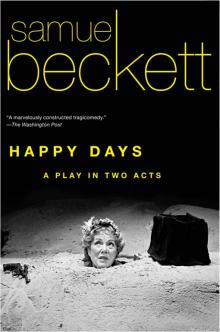 Happy Days
Happy Days Breath, and Other Shorts
Breath, and Other Shorts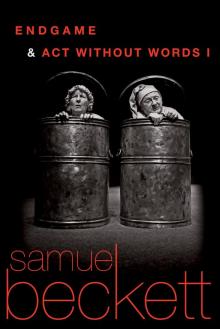 Endgame & Act Without Words
Endgame & Act Without Words The Collected Shorter Plays of Samuel Beckett
The Collected Shorter Plays of Samuel Beckett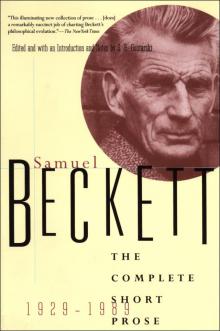 The Complete Short Prose, 1929-1989
The Complete Short Prose, 1929-1989 Stories and Texts for Nothing
Stories and Texts for Nothing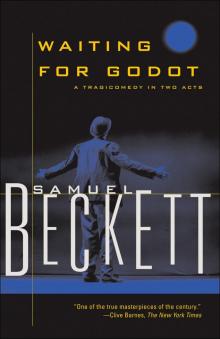 Waiting for Godot
Waiting for Godot Rockaby and Other Short Pieces
Rockaby and Other Short Pieces First Love and Other Shorts
First Love and Other Shorts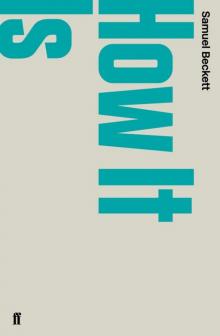 How It Is
How It Is Disjecta: Miscellaneous Writings and a Dramatic Fragment
Disjecta: Miscellaneous Writings and a Dramatic Fragment Echo's Bones
Echo's Bones Texts for Nothing and Other Shorter Prose 1950-1976
Texts for Nothing and Other Shorter Prose 1950-1976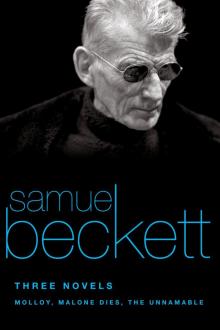 Three Novels
Three Novels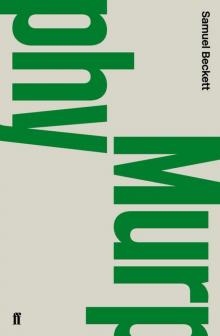 Murphy
Murphy Mercier and Camier
Mercier and Camier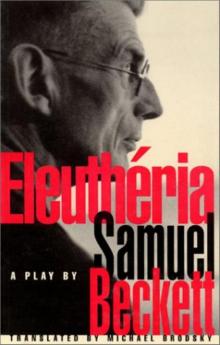 Eleuthéria
Eleuthéria Selected Poems 1930-1988
Selected Poems 1930-1988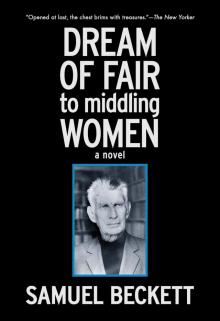 Dream of Fair to Middling Women
Dream of Fair to Middling Women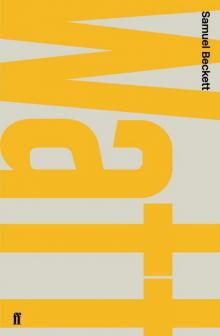 Watt
Watt Krapp's Last Tape and Other Dramatic Pieces
Krapp's Last Tape and Other Dramatic Pieces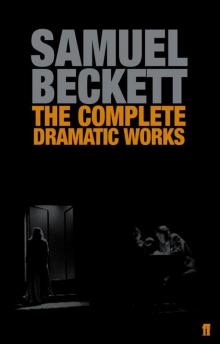 The Complete Dramatic Works of Samuel Beckett
The Complete Dramatic Works of Samuel Beckett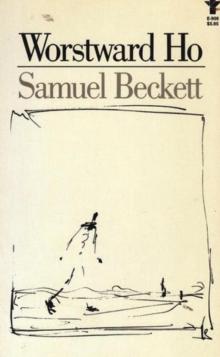 Worstward Ho
Worstward Ho Collected Poems in English and French
Collected Poems in English and French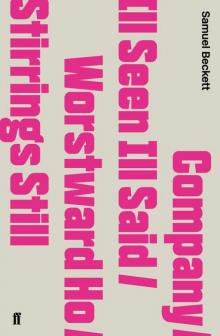 Company / Ill Seen Ill Said / Worstward Ho / Stirrings Still
Company / Ill Seen Ill Said / Worstward Ho / Stirrings Still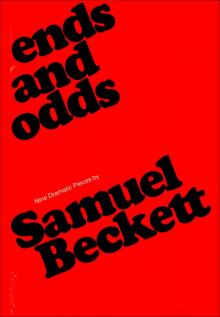 Ends and Odds
Ends and Odds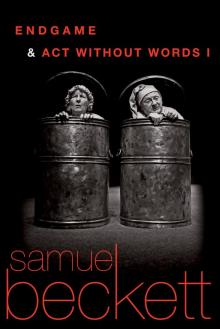 Endgame Act Without Words I
Endgame Act Without Words I Rockabye and Other Short Pieces
Rockabye and Other Short Pieces The Collected Shorter Plays
The Collected Shorter Plays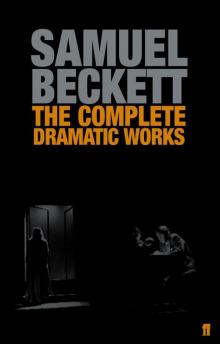 The Complete Dramatic Works
The Complete Dramatic Works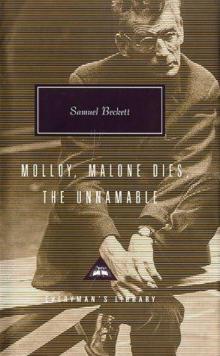 Three Novels: Malloy, Malone Dies, The Unnamable
Three Novels: Malloy, Malone Dies, The Unnamable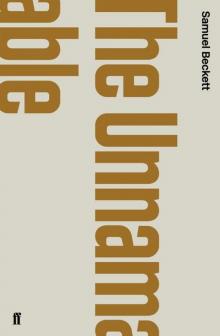 The Unnamable
The Unnamable